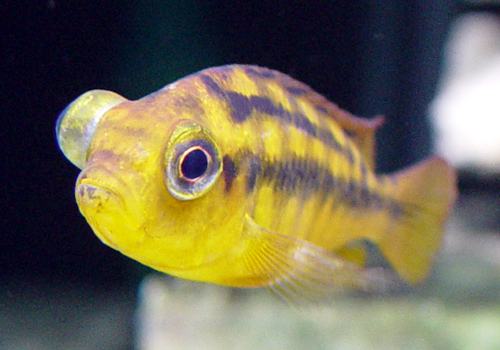
Treating Pop-Eye
Pop-eye or Exophthalmia
This is a common affliction of large Central and South American cichlids, as well as large cyprinids like goldfish, carp and koi. While parasites can be responsible for the development of Pop-eye, poor water quality and nutritional deficiencies are the more likely culprits. An immuno-compromised fish is susceptible to the bacteria that can cause this symptom to manifest. In severe cases of Pop-eye, the eye socket ruptures and the fish loses that eye. Sometimes only one side is affected, other times both eyes are affected. Stress can also induce a bout with Pop-eye. Poor transporting methods, fluctuations in temperature and overcrowding can all result in a highly-stressed fish that a prime candidate for attack by pathogenic organisms.
Treating Pop-eye or Exopthalmia
This is a condition seen far too often in aquarium fish and is usually the result of fluid build-up behind one or both eyes from the fish’s osmoregulatory processes being hindered. Osmosis is the process by which fish regulate the concentration of fluid in their tissues. In freshwater fish, they excrete it nearly constantly as water constantly flows into their bodies from the surrounding water. Marine fish do the opposite as they are constantly loosing body fluid to the water around them. It can also be the action of an internal bacterial infection at work, but most times it is excess fluid. If you suspect stress is the culprit because the affected fish was newly introduced or is an established resident that is being bullied, you need to isolate him and treat him with an extended light salt bath (.3% to .4% which translates into 15 to 18 grams of aquarium salt per gallon, weigh it with a food scale) in a quarantine or hospital tank if it is a freshwater fish. For marine fish, do the opposite in a quarantine tank and lower the salinity a bit so it falls in the range of 1.018 to 1.020 and keep it there for about two weeks. You can also administer a round of antibiotics that are effective against gram-negative bacteria, as these are the usual culprits responsible for protruding eyes. If it actually is a full-blown systemic bacterial infection and the entire body becomes swollen with protruding scales, the prognosis is quite grim. The damage to the kidneys and other internal organs is such that the fish is unable to regulate its body fluids and succumbs to an early demise. Antibacterial foods may also help, but fist thing fish do when they fall ill is go off their food, so it doesn’t do much good to offer medicated foods if the fish isn’t eating. Such outbreaks are better avoided by quarantining new fish and allowing them to settle down before introducing them into a tank full of strangers and possibly less than ideal conditions. Supplementing the diet with a variety of high-quality foods soaked in a liquid vitamin preparation for fish that take to eating again helps a great deal in aiding them to heal on their own.


